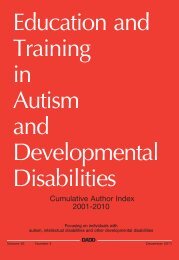Education and Training in Autism and Developmental Disabilities
Education and Training in Autism and Developmental Disabilities
Education and Training in Autism and Developmental Disabilities
Create successful ePaper yourself
Turn your PDF publications into a flip-book with our unique Google optimized e-Paper software.
ways <strong>in</strong> the same <strong>in</strong>terviews where statements<br />
reflect<strong>in</strong>g limited actions that could be characterized<br />
as family-centered. Examples of<br />
these language-action contradictions are<br />
given by two respondents:<br />
R: I th<strong>in</strong>k the parents should be able to list<br />
out exactly what they would like to see their<br />
child achieve, whether it is personal goals.<br />
You know, basically lay it out <strong>in</strong> lists they can<br />
give to the teacher that really help them<br />
know the student as the child, as a personal<br />
<strong>in</strong>dividual. . . . I don’t know what else the<br />
parents would provide.<br />
The second example of a contradiction <strong>in</strong>volves<br />
the professional speak<strong>in</strong>g <strong>in</strong> a familycentered<br />
manner about communication notebooks<br />
be<strong>in</strong>g sent home to families. Dur<strong>in</strong>g the<br />
same <strong>in</strong>terview, the respondent made this<br />
comment: “R: The other kid I work with, his<br />
mom is <strong>in</strong> due process, so I try to be as vague<br />
as possible because I don’t want th<strong>in</strong>gs used<br />
aga<strong>in</strong>st us . . .”<br />
Goldilocks Perception<br />
We refer to the second theme as the “Goldilocks<br />
perception” because it appeared the<br />
professionals who participated <strong>in</strong> the study<br />
had very specific ideas regard<strong>in</strong>g the “just<br />
right” amount of <strong>in</strong>volvement <strong>in</strong> which they<br />
believed was appropriate for parents. They<br />
noted def<strong>in</strong>ite l<strong>in</strong>es that parents might cross,<br />
result<strong>in</strong>g <strong>in</strong> too much <strong>in</strong>volvement. However,<br />
they also described cases <strong>in</strong> which they believed<br />
parents were not <strong>in</strong>volved enough.<br />
From their po<strong>in</strong>t of view, parents had only a<br />
narrow w<strong>in</strong>dow of <strong>in</strong>volvement that might be<br />
considered “just right.”<br />
Too much <strong>in</strong>volvement. If a parent crossed<br />
over <strong>in</strong>to the professionals’ area of expertise,<br />
that parent was often considered “too <strong>in</strong>volved.”<br />
This sub-theme of too much <strong>in</strong>volvement<br />
<strong>in</strong>cluded both amount <strong>and</strong> an unwanted<br />
type of <strong>in</strong>volvement. In some cases, professionals<br />
were frustrated when a parent entered the<br />
academic realm or frequently questioned<br />
what they did. The follow<strong>in</strong>g comments suggest<br />
that professionals may be threatened by<br />
parents who participate to the extent of acquir<strong>in</strong>g<br />
expertise about <strong>in</strong>terventions for their<br />
child:<br />
R: She’s up there all the time want<strong>in</strong>g to<br />
know . . . well why haven’t you worked on<br />
this. And his therapist says he needs to be<br />
do<strong>in</strong>g this, <strong>and</strong> why haven’t you been do<strong>in</strong>g<br />
this, <strong>and</strong> why haven’t [you been do<strong>in</strong>g that]<br />
. . . So it seems like we are bend<strong>in</strong>g over<br />
[backwards]. Like I’ve ordered several<br />
books just to make this parent happy just so<br />
I can be like, look I am do<strong>in</strong>g research on<br />
this, you know. And a lot of times the parents<br />
will go to the Board. So we’ve always<br />
got to watch our back . . .<br />
R: They might read someth<strong>in</strong>g com<strong>in</strong>g out<br />
<strong>in</strong> a journal <strong>and</strong> why aren’t you do<strong>in</strong>g that<br />
for my child? And then you’re like, Holy<br />
cow, I have eight years of experience, <strong>and</strong> I<br />
keep up on that too. Let me do my job!<br />
They are mak<strong>in</strong>g progress. This is what<br />
we’re do<strong>in</strong>g.<br />
Some respondents thought that parents’ <strong>in</strong>volvement<br />
meant that the parent did not trust<br />
them to do their jobs.<br />
I: Do you th<strong>in</strong>k there is such th<strong>in</strong>g as be<strong>in</strong>g<br />
too <strong>in</strong>volved?<br />
R: Yes! Def<strong>in</strong>itely I do! Like earlier, work<strong>in</strong>g<br />
as a team, not say<strong>in</strong>g I’m the expert; you’re<br />
not. I th<strong>in</strong>k some parents won’t trust the<br />
teacher, so they’ll want to be there for everyth<strong>in</strong>g,<br />
be <strong>in</strong>volved for everyth<strong>in</strong>g, every<br />
decision.<br />
R: I th<strong>in</strong>k it is great when families are very<br />
<strong>in</strong>volved–as long as they aren’t totally runn<strong>in</strong>g<br />
the show. And I have seen that happen<br />
where they try to do that, <strong>and</strong> it doesn’t<br />
work . . . they become a big pa<strong>in</strong> . . . it’s a<br />
subtle message that maybe you’re not competent<br />
enough . . .<br />
Too little <strong>in</strong>volvement. Though participants<br />
<strong>in</strong> this study were specific about too much<br />
<strong>in</strong>volvement, they also expressed frustration<br />
when families had too little <strong>in</strong>volvement. Parents<br />
were considered “to have too little <strong>in</strong>volvement<br />
when they chose to not participate<br />
<strong>in</strong> activities or did not see the same value <strong>in</strong><br />
the activities the professionals deemed important.<br />
One participant expressed this idea<br />
when she said: “Here’s what you can do to<br />
address these at home, <strong>and</strong> then they don’t<br />
follow through. I ask the girl, <strong>and</strong> she is pretty<br />
reliable, <strong>and</strong> she wouldn’t lie, <strong>and</strong> I ask “Have<br />
you done this with mom?” “No.”<br />
360 / <strong>Education</strong> <strong>and</strong> <strong>Tra<strong>in</strong><strong>in</strong>g</strong> <strong>in</strong> <strong>Autism</strong> <strong>and</strong> <strong>Developmental</strong> <strong>Disabilities</strong>-September 2010

















